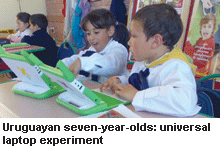For the past year the pupils of Escuela 95, a school in a poor neighbourhood of Montevideo (pop 1.3 million), have had a new learning tool. Each has been issued a laptop computer. This has been of particular help to the 30 or so children with severe learning difficulties, says Elias Portugal, a special-needs teacher at the school. Before, he struggled to give them individual attention. Now, the laptops are helping them with basic language skills. “The machines capture the kids’ attention. They can type a word and the computer pronounces it,” says Portugal.
 Nearly all 380,000 primary school pupils in Uruguay (pop. 3.8 million) have now received a simple and cheap XO laptop, a model developed by One Laptop Per Child, an NGO based in Massachusetts, USA. The government hopes this will help poor and disadvantaged children do better in school while also improving the overall standard of education. These ambitions will be tested for the first time in end October when every Uruguayan seven-year-old writes online exams in a range of academic subjects. The rest of the world should be intrigued: the first country in Latin America to provide free, compulsory schooling will become the first globally to find out whether furnishing a whole generation with laptops is a worthwhile investment. (Peru, a bigger, poorer and less homogenous country, is trying something similar.)
Nearly all 380,000 primary school pupils in Uruguay (pop. 3.8 million) have now received a simple and cheap XO laptop, a model developed by One Laptop Per Child, an NGO based in Massachusetts, USA. The government hopes this will help poor and disadvantaged children do better in school while also improving the overall standard of education. These ambitions will be tested for the first time in end October when every Uruguayan seven-year-old writes online exams in a range of academic subjects. The rest of the world should be intrigued: the first country in Latin America to provide free, compulsory schooling will become the first globally to find out whether furnishing a whole generation with laptops is a worthwhile investment. (Peru, a bigger, poorer and less homogenous country, is trying something similar.)
The scheme has already proved popular. Miguel Brechner, the organiser, says it has brought home-computing to tens of thousands of poorer households, while also reducing truancy. It is fairly cheap. Each machine costs $260 (Rs.12,000) including teacher-training and connection charges, and the estimated annual maintenance cost is $21 (Rs.975). In total, the scheme has cost less than 5 percent of the national education budget.
But is this the best use of the money? There have been several glitches. The first 50,000 laptops arrived loaded with software in English, not Spanish. In Escuela 95, up to half of the students in some classes have broken their machines, usually by cracking the screen or snapping the antennae that pick up a wi-fi signal. When poor, rural children wreck theirs, they often prefer to keep their new status symbol clutched to their chests rather than risk the postal service not returning it promptly from the central maintenance centre.
The biggest technical problem is connectivity. The government reported in September that in 70 percent of primary schools only half the laptops can go online at the same time. Two out of five rural schools have no connection, and will have to bus their students elsewhere for the exam. Many of Uruguay’s rather elderly teachers find it hard to cope with new technology.
Skeptics would rather the government concentrate on making teachers more accountable. But most admit the laptops are worth a try. They should prompt a shift away from rote learning and toward critical analysis, says Edith Moraes, the official in charge of primary schools. They extend Uruguay’s egalitarianism to computing. They should be seen merely as a means to the end of better schooling.
(Excerpted and adapted from The Economist)